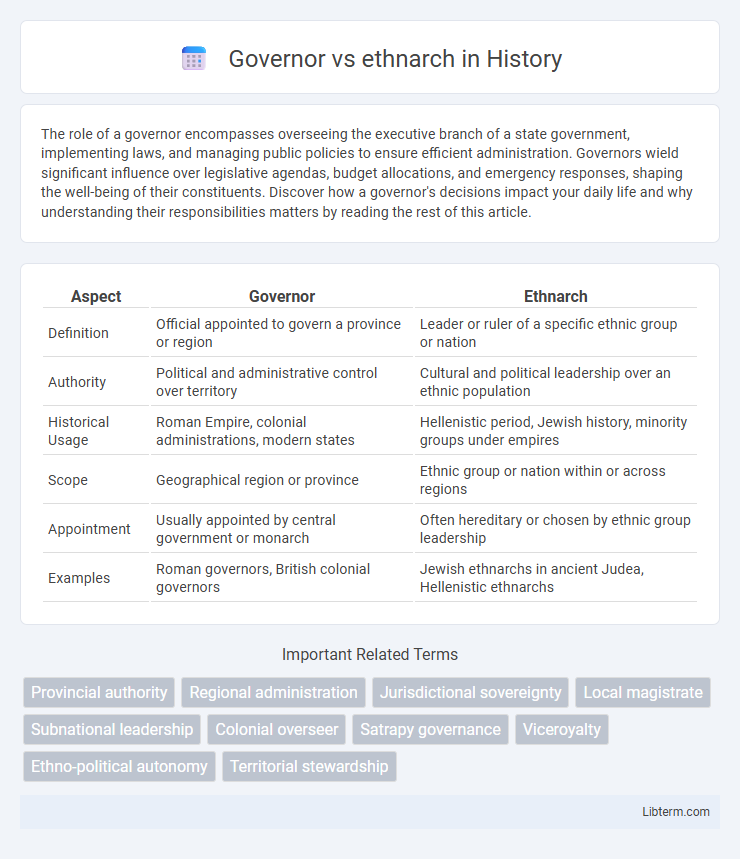The role of a governor encompasses overseeing the executive branch of a state government, implementing laws, and managing public policies to ensure efficient administration. Governors wield significant influence over legislative agendas, budget allocations, and emergency responses, shaping the well-being of their constituents. Discover how a governor's decisions impact your daily life and why understanding their responsibilities matters by reading the rest of this article.
Table of Comparison
| Aspect | Governor | Ethnarch |
|---|---|---|
| Definition | Official appointed to govern a province or region | Leader or ruler of a specific ethnic group or nation |
| Authority | Political and administrative control over territory | Cultural and political leadership over an ethnic population |
| Historical Usage | Roman Empire, colonial administrations, modern states | Hellenistic period, Jewish history, minority groups under empires |
| Scope | Geographical region or province | Ethnic group or nation within or across regions |
| Appointment | Usually appointed by central government or monarch | Often hereditary or chosen by ethnic group leadership |
| Examples | Roman governors, British colonial governors | Jewish ethnarchs in ancient Judea, Hellenistic ethnarchs |
Introduction: Defining Governor and Ethnarch
A governor is an official appointed to oversee and administer a political or administrative region, ensuring the enforcement of laws and governmental policies. An ethnarch is a leader specifically appointed to govern a distinct ethnic or national group within a larger state, focusing on cultural and community interests. While governors manage broader territorial jurisdictions, ethnarchs hold authority primarily over ethnic or communal affairs.
Historical Origins of the Terms
The term "governor" originated from the Latin word "gubernator," meaning a pilot or helmsman, reflecting its historical use in Roman and later European administrative contexts as an official appointed to oversee a province or territory. "Ethnarch" derives from the Greek "ethnos," meaning nation or people, and "archon," meaning ruler, signifying a leader who governs a specific ethnic group or nation, particularly in Hellenistic and early Jewish history. While governors managed political or military administration of diverse populations within empires, ethnarchs held authority based on ethnic or cultural leadership, often recognized in autonomous or semi-autonomous regions.
Governor: Roles and Responsibilities
A Governor holds administrative authority over a specific political or territorial unit, primarily responsible for implementing laws, managing public services, and maintaining order within their jurisdiction. This role entails overseeing government departments, coordinating with law enforcement, and ensuring economic development aligns with national policies. Unlike an ethnarch, whose leadership is often culturally or ethnically based, a Governor's duties are rooted in civil governance and legal administration.
Ethnarch: Meaning and Significance
Ethnarch refers to a political leader who governs a specific ethnic group or nation, often maintaining cultural and religious autonomy within a larger imperial or state framework. The term holds significant historical importance in regions like the Hellenistic world and the Roman Empire, where ethnarchs managed internal ethnic affairs while upholding loyalty to the overarching ruler. Unlike governors, who administer territorial provinces with political and military authority, ethnarchs primarily focus on preserving the identity and self-governance of their ethnic communities.
Governance Structures: Comparing Authority
Governors typically hold formal political authority appointed by central governments, exercising administrative control over defined territories with a focus on implementing state policies and maintaining order. Ethnarchs govern based on ethnic or cultural leadership, deriving authority from group consensus or traditional legitimacy rather than official state appointment, often maintaining social cohesion and representing ethnic interests. The governance structure of a governor emphasizes centralized legal authority and bureaucratic administration, while an ethnarch operates through decentralized, community-based power rooted in identity and custom.
Cultural and Regional Contexts
Governors traditionally administer political and administrative functions within a state's jurisdiction, emphasizing legal authority and institutional governance. Ethnarchs hold leadership roles centered around a specific ethnic group's cultural identity, customs, and communal interests, often operating within or alongside formal state structures. The distinction reflects differing priorities: governors exercise centralized control over diverse populations and territories, while ethnarchs focus on preserving ethnic cohesion and heritage within a cultural or regional context.
Appointment and Selection Process
Governors are typically appointed by a central authority such as a monarch, president, or government body, often through formal political or bureaucratic procedures that emphasize loyalty and administrative competence. Ethnarchs, in contrast, are usually selected within the community they lead, often through hereditary succession, tribal consensus, or local traditions that emphasize ethnic or cultural legitimacy. The appointment of governors reflects state control and integration, whereas ethnarch selection prioritizes community identity and self-governance.
Influence on Local Populations
Governors wielded broad administrative authority over provinces, implementing imperial policies that often balanced direct control with local customs to maintain order. Ethnarchs typically held more limited power, acting as intermediaries who governed specific ethnic groups while preserving cultural autonomy and traditions. The influence of governors usually extended through formal political structures, whereas ethnarchs maintained social cohesion by reinforcing ethnic identity and local leadership.
Modern Relevance and Usage
The term "Governor" in modern governance commonly refers to an official appointed or elected to administer a state or province, embodying centralized political authority and accountability within national frameworks. In contrast, "Ethnarch" historically denotes a leader governing a specific ethnic group, with contemporary relevance primarily in analyzing minority autonomy, cultural self-governance, or diasporic leadership structures. Understanding the distinction enhances discussions on political representation, regional autonomy, and ethnic identity in global governance and sociopolitical studies.
Conclusion: Key Differences and Implications
Governors typically hold official administrative authority within a state's formal political structure, managing broader territorial governance, while ethnarchs exercise leadership primarily over specific ethnic or cultural groups, often with a focus on preserving identity and customs. This distinction underscores the governor's role in implementing state policies versus the ethnarch's emphasis on cultural autonomy and group cohesion. Understanding these roles helps clarify the balance between centralized governmental control and the protection of ethnic group interests within diverse societies.
Governor Infographic

 libterm.com
libterm.com